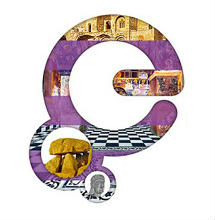Portfolio
Welcome to the MORe Portfolio section. Here you can see some of the projects in which the MORe aggregator was successfully used.

Local content in a Europeana cloud
LoCloud aims to build on the achievements of CARARE in establishing a repository-based aggregator for Archaeological and Architectural heritage and of Europeana Local in its work with local institutions and their regional and national aggregators, which resulted in the contribution to date of well over 5 million items to Europeana.
The main goals of LoCloud are:- to continue to ease the task of enabling heritage organizations in making their contents accessible via Europeana, by using cloud technologies to provide services and tools which help to reduce technical, semantic and skills barriers,
- to facilitate aggregation of digital content from small and medium cultural institutions, to be made available to Europeana,
- to enable smaller institutions such as house-museums to contribute their content to Europeana,
- to explore the potential of cloud computing for aggregation, enrichment and re-use, with a special focus on geographic location.
- evaluating and appraising content and metadata among collections participating in LoCloud, as well as developing a metadata sourcing strategy and plan,
- designing technical specifications of the core infrastructure components,
- specifying and carrying out necessary developments in the existing MoRe aggregation service (store.carare.eu) sufficient to enable ingestion, data management and continued delivery to Europeana,
- analyzing and enriching the metadata being provided to Europeana, with the implementation of the Natural Language Processing (NPL) tools, as well as including the enriched content into the repository,
- developing an application to enable local cultural institutions to collaborate in the development of a historical place name gazetteer, and to enrich the harvested/ingested metadata,
- developing and hosting a portal facility for small and medium sized content providers and aggregators
Original location: http://www.locloud.eu/

Advanced Research Infrastructure for Archaeological Dataset Networking in Europe
ARIADNE (FP7-INFRASTRUCTURES-2012-1) aims to integrate the existing archaeological research data infrastructures so that researchers can use the various distributed datasets and new and powerful technologies as an integral component of the archaeological research methodology. There is now a large availability of archaeological digital datasets that altogether span different periods, domains and regions; more are continuously created as a result of the increasing use of IT. They are the accumulated outcome of the research of individuals, teams and institutions, but form a vast and fragmented corpus so that their potential is constrained by difficult access and non-homogenous perspectives.
To achieve this result, the project will use a number of integrating technologies that build on common features of the currently available datasets, and on integrating actions that will build a vibrant community of use. This integrating activity will enable trans-national access of researchers to data centres, tools and guidance, and the creation of new Web-based services based on common interfaces to data repositories, availability of reference datasets and usage of innovative technologies. It will stimulate new research avenues in the field of archaeology, relying on the comparison, re-use and integration into current research of the outcomes of past and on-going field and laboratory activity. Such data are scattered amongst diverse collections, datasets, inaccessible and unpublished fieldwork reports "grey literature", and in publications, the latter still being the main source of knowledge sharing.
Twenty four partners from all over Europe participate in the project, which has a total budget 8,464,556.00 Euros and is coordinated by PIN SOC.CONS. A R.L. - SERVIZI DIDATTICI E SCIENTIFICI PER L UNIVERSITA DI FIRENZE. DCU is leading the Work Package WP3, which will be responsible for:
- a metadata registry for archaeological resources,
- the design and implementation of long term preservation services, and
- the implementation of the interoperability framework of the ARIADNE infrastructure
Original location: http://www.ariadne-infrastructure.eu/
3D Digitisation of Icons of European Architectural and Archaeological Heritage
3DIcons aims to digitise a series of architectural and archaeological masterpieces of world and European cultural significance and provide 3D models and related digital content to Europeana, with the purpose of contributing to the critical mass of highly engaging content available to users.
The provision of high quality 3D cultural heritage content goes above the current technological trends. It provides a highly attractive format for engaging with the cultural heritage which is increasingly popular with users as it allows better understanding and appreciation of our cultural treasures.
The project will exploit existing tools and methods, to integrate them in a complete supply chain of 3D digitisation to contribute a significant mass of 3D content to Europeana. It will focus on UNESCO World Heritage monuments and other monuments of outstanding value at European level, to illustrate a particular strand of Europe’s history. The project aims to complement the collections which are being made accessible to Europeana via CARARE, Europeana Local, Athena and other projects which have developed the content base for the archaeological and architectural heritage. In particular, 3D-ICONS aims to complement the 3D content brought to Europeana via the CARARE project and to increase the critical mass of this engaging content.
The digital content will include overall 3D models and reconstructions, enlarged models of important details, images, texts, videos. It will also include and re-contextualize in 3D, objects belonging to a monument but presently located elsewhere, for example in a museum. The project’s activities will include both new digitisation as well as the conversion of some existing 3D data into formats which are accessible for Europeana users. The project’s anticipated impact is making accessible through Europeana an unprecedented quantity of high-quality, 3D, well-organized and attractive information about the masterpieces of European architecture and archaeology.
In 3DIcons, DCU is leading the Work Package 6 responsible for Making Content Available to Europeana, which will be responsible for:
- adopting the CARARE metadata schema to the project,
- planning and implementing a timetable for harvesting and aggregating each partners’ metadata.
- providing for the CARARE metadata repository and its services including interoperability with MINT and with Europeana.
Original location: http://3dicons-project.eu/

Connecting ARchaeology and ARchitecture in Europeana
CARARE was a proposal to establish over 3 years a Best Practice Network and aggregation service and improve the interoperability with Europeana of the digital content available from the archaeology and architectural heritage domain. It involved heritage organisations, archaeological museums and specialist archives to expand Europeana’s network of content providers and made available the rich diversity of content for unique archaeological monuments, historic buildings and town centres. Distributed 2D and 3D content for heritage places brought together and linked up in Europeana with this critical mass of geographically referenced content creating the potential for new map-based commercial and public services for tourism, education and research to be set up. CARARE worked with the EDL Foundation to establish efficient processes to aggregate contents from heritage organisations, addressing practical issues relating to the harvesting of 3D/VR formats, the rich semantics of archaeology and architecture content and the handling of geographic information. The network implemented the protocols, standards and schemas recommended for Europeana contributing expertise on 3D/VR, GI, time and space to the development of the Europeana object model and semantic tools. CARARE brought together a consortium representing 20 countries and organizations with broad ranging experience of the heritage sector, digital libraries, standards and aggregation services. It made around 2 million items available.
Original location: http://www.carare.eu/
